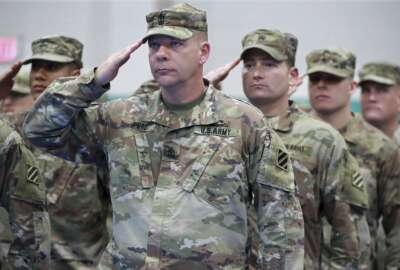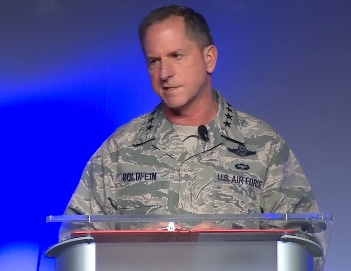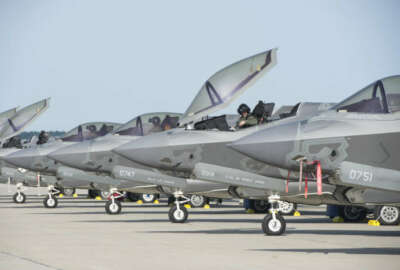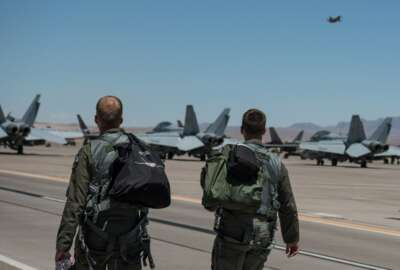
Air Force making final preps to reform officer promotion system
The Air Force is building a new promotion system that it hopes will align its professed values with the officers it actually selects for elevation to senior...
Best listening experience is on Chrome, Firefox or Safari. Subscribe to Federal Drive’s daily audio interviews on Apple Podcasts or PodcastOne.
The Air Force is putting the finishing touches on a proposed overhaul of its personnel management system for officers. They would be the service’s first large-scale reforms since the 1980s, and the goal, by the end of the process, is a system that promotes officers who genuinely exhibit the leadership characteristics the Air Force says it values.
All 280 of the service’s wing commanders were set to meet in Washington on Thursday to deliver feedback on some of the changes the Air Force is contemplating. Gen. David Goldfein, the Air Force chief of staff, plans to deliver his final recommendations to the Air Force secretary by the end of the month.
Speaking earlier in the week at the Air Force Association’s annual conference in National Harbor, Maryland, Goldfein said the revised system aims to promote officers based solely on four factors: Their contributions to mission execution, how well they lead and mentor subordinates, how they manage resources, and what they’ve done to improve the unit they’re currently serving in.

As for what the focus on those criteria will mean in practice, the Air Force said they’ll yield reforms that introduce more objective, measurable benchmarks to determine who gets promoted and who doesn’t. And those benchmarks will focus more on an officer’s recent performance than good or bad marks they may have received years earlier in their careers.
“We’re going to use those four factors to come up with an objective score,” said Lt. Gen. Brian Kelly, the Air Force’s personnel chief. “And the objective score will be something like this: the rater is going to go through and read those different areas and say, okay, are you a novice in this area or are you an expert in this area? We’re still in the formation stages, but right now we’re thinking about a seven point scale.”
And because some senior officers who conduct officer performance reports might be more or less forgiving than others, the Air Force would then “normalize” all the scores given by that particular rater.
“Then we can account for, are they Santa Claus or are they the Grinch in terms of what they give out? And then we’ll have a chance to compare that person’s score across their peers,” Kelly said. “We think that’s a better way for us to be able to drive and empower performance.”
The Air Force also wants to get rid of what Kelly termed a “one-size-fits-all” promotion track. Instead of insisting that all officers attain certain levels of command at pre-determined points in their career in order to be considered promotable, he said the service will break its officer corps down into “developmental categories.”
The six categories: Special operations, space operations, nuclear missile operations, information warfare, combat support and force modernization, are meant to make the promotion system more flexible.
“We need more agile development,” he said. “We need to let people develop in different ways, and we’re unlocking the ability to not be beholden to or not worry about how you’re going to compete against others in a promotion board who may be not like you. It gives us the idea that we can develop differently and develop in the ways we need to.”
And treating different types of airmen differently is also likely to mean the service won’t necessarily penalize them for wanting or needing to stay in the same position or location for longer than the standard two-to-three years.
“Right now what happens is if you stay too long on-station, when you go to a promotion board, someone will say, ‘they’ve homesteaded.’ As we’ve worked on these developmental categories, each of those areas now has the ability to adjust those discussions and decide what’s the right time-on-station criteria. I’ll use the force modernization category as an example: There is great value in us having more time to work an acquisition program to have continuity from year-to-year as we go through a program. This will allow us to do that without that having a negative impact in terms of the promotion, because the promotion board will be looking at other officers who have the same values.”
Related Stories
Under the pseudonym Ned Stark, Lamb wrote biting critiques of the status quo in War on the Rocks and in the Air Force Times, positing that the promotion system is fundamentally broken. In that system, he argued, the Air Force identifies airmen as “high-potential” leaders early in their careers — when they’re mere captains. After that, it’s virtually impossible to remove them from an eventual pathway to general officer, even if they’ve proven to be toxic commanders in the meantime.
Goldfein took the criticism on, and asked “Stark,” who has become something of a modern-day Air Force folk hero, to work at the Pentagon on a team that’s been working on personnel reforms since last year.
Appearing alongside Kelly onstage at AFA on Wednesday, Lamb said the Air Force needs a promotion system that cares a lot more about what an officer has done lately than how many degrees or awards he or she has, or what the airman might have done several years ago.
“I have four masters degrees, and three of them are in the same subject. Why?” he asked, to applause from the mostly-uniformed audience. “That was three years where I could have been contributing to the mission that were lost. I mean, they were just lost.”
With the Air Force now in growth mode, Lamb said it’s especially important that the service pay more attention to promoting leaders who’ve shown they’re ready and able to take on senior positions based on their immediate history.
“Your past is interesting only as it relates to what you can do today. Your past should not define or limit your path in the Air Force — or artificially propel you to places that you should have never been,” he said.
Lamb said the system also needs more accountability on several fronts. Both in his writings and on stage Wednesday, he suggested it tends to reward leaders who are risk averse, especially ones who defer decisions and ignore innovative proposals from their more junior ranks because they might not work.
Latest Defense News
Similarly, Lamb said, the current system carries no penalties for senior officers who know — or have reason to believe — that a person they’re promoting or championing doesn’t belong in a leadership position.
“Senior leaders need to be accountable for who they’re pushing into or hiring into positions of trust. When we hire someone and they get fired for integrity issues, lack of judgment, creating a toxic or hostile work environment, I promise you it wasn’t the first time that they’ve engaged in those behaviors. There was a long line of more senior officers who pushed that individual along,” he said. “There’s no accountability. There’s no feedback loop; it doesn’t affect our senior leaders in any way. And until there is an accountability mechanism, a way to follow up and have actual meaningful consequences, this system isn’t going to change.”
Copyright © 2025 Federal News Network. All rights reserved. This website is not intended for users located within the European Economic Area.
Jared Serbu is deputy editor of Federal News Network and reports on the Defense Department’s contracting, legislative, workforce and IT issues.
Follow @jserbuWFED








